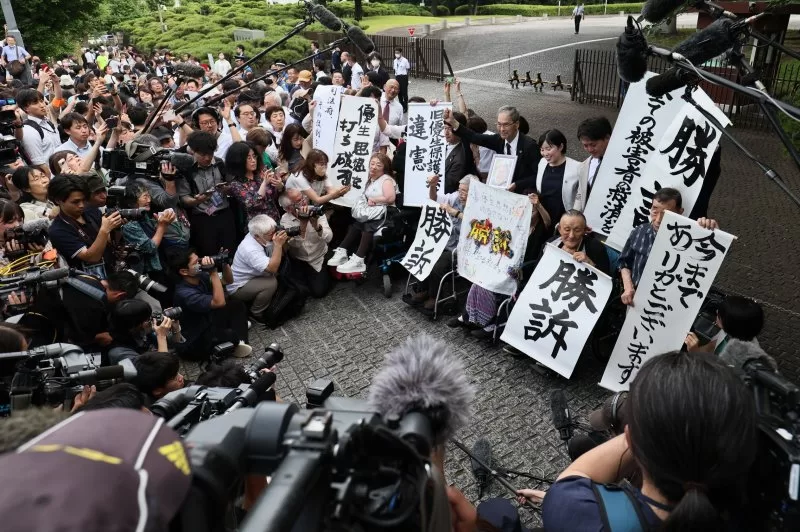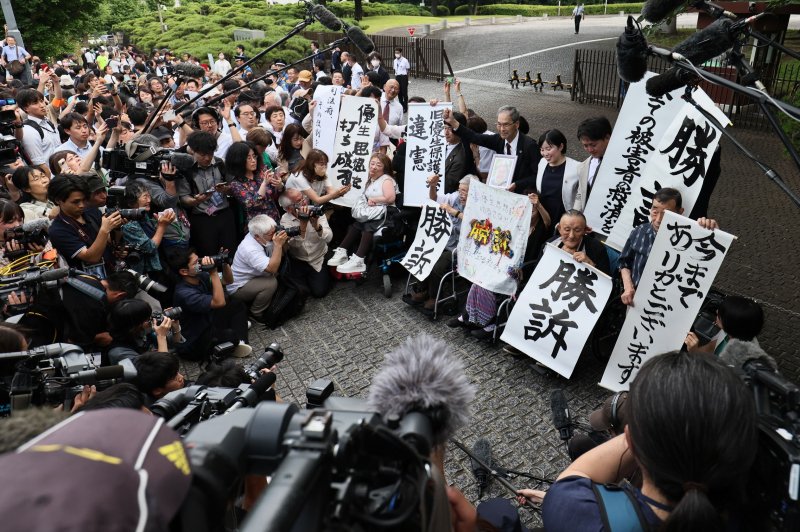Plaintiffs hold up ‘victory’ banners as they celebrate outside Japan’s Supreme Court in Tokyo after justices ruled sterilizations carried out decades ago under eugenics laws, some without victims’ consent, violated their constitutional rights and that the government must pay out compensation. Photo by Jiji Press/EPA-EFE
July 3 (UPI) — A group of Japanese men and women subjected to forced sterilization between the 1950s and 1970s won the right to compensation from the government in a landmark ruling in Japan’s Supreme Court on Wednesday.
The 15-judge bench ruled for the first time that the surgery, carried out under now-lapsed eugenics legislation, was unconstitutional and that the 20-year statute of limitations did not apply in cases involving the law which targeted those with intellectual disabilities, mental illness or hereditary disorders to ensure their “inferior” children would never be conceived.
The unanimous judgment condemned allowing the government to dodge liability through the statute of limitations as “extremely unfair and unjust,” calling its application by the state “intolerable,” an abrogation of the “duty of good faith” and “an abuse of power.”
Upholding the finding of five lower courts, the judges agreed the law was unconstitutional, they said, because it violated Article 13 of the Constitution guaranteeing the freedom of people not to undergo physically invasive procedures against their will, as well as their right to equality under Article 14.
Government figures put the estimated number of people who were sterilized under the 1948 law which was in force for almost four decades until it was repealed in 1996, at around 25,000 with 16,000 subjected to procedures without their consent.
The ruling enabling the plaintiffs to seek compensation sets a precedent for other victims in similar situations whose lawyers are pushing for a final resolution for their clients, all of whom are now in advanced age.
Prime Minister Fumio Kishida pledged immediate steps to correct the injustice.
Apologizing to the victims, Kishida promised a meeting by the end of the month to say sorry in person and said he had ordered his ministers for justice and equality to draw up a scheme to compensate them.
“I’ve instructed [Equalities] minister Ayuko Kato to consider measures to draft a new compensation framework in a swift manner.”
The plaintiffs, who filed the lawsuits at five district courts in cities across the main islands of Honshu and Hokkaido were among 39 people pursuing similar lawsuits at 11 district courts and a branch court.
All five courts that heard the cases of the plaintiffs in Wednesday’s case ruled the law was unconstitutional.
Judges in four of the courts threw out the time-limit defense and ordered the government to pay between $68,000 and $102,000 to each victim, and $13,600 to the spouse of a victim who had since died, far exceeding the $19,750 one-off payments to around 1,100 people under legislation passed in 2019.
The fifth court ruled the statute of limitations did apply forcing the Supreme Court, despite overturning that decision, to return the case to the court in Sendai, 230 miles northeast of Tokyo, for it to decide on the compensation figure due to the plaintiffs.

